Student Blog
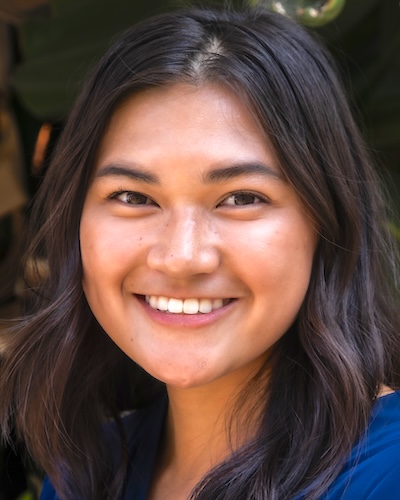
Grad Application . . . Let’s Talk About It ⟩
December 18, 2024, by Cara
Since deciding to pursue a career in OT, I knew that graduate school would be an eventual part of my academic journey. I’ve recently finished the graduate school application process and while it’s fresh in my mind, I have some tips to share!
1. Choosing Programs — What Do You Want Out of It?
When selecting a program, it’s important to consider what you want to gain from the experience. Each program is unique in its own way, so here are some factors I considered when choosing the right fit for me:
- Curriculum
Does the program offer a good balance between theory and clinical work? Think about whether you want to understand more of the theoretical foundations of what you’re doing, or if you’re someone who prefers to jump into clinical work and learn as you go. - Opportunities
What resources does the program offer? Look into opportunities beyond lab and fieldwork, such as community clinics where you can gain experience early on. Additionally, research the fieldwork placements — are they local or global? - Diversity
As OT helps people from various backgrounds, consider a program that values diversity. Research how diverse the student body, faculty, and the community outreach are. Exposure to different perspectives in your cohort helps you grow your empathy and awareness. And with the guidance of faculty across diverse subjects, you’ll learn the necessary skills to help people holistically.
2. Observation / Volunteer Experience
Some programs may require 40–80 hours of relevant experience, which may seem daunting, but it’s totally doable! I gained mine by networking through family friends and reaching out to clinics I found through Google. Even if experience is optional, I strongly encourage you to still do it. Such experiences helped me see all the ways I can make a difference as an OT, discovering the settings and specialties that resonated most with me, and reaffirmed my passion for the field. If you’re unsure where to start, check out our list of volunteer and observation opportunities across the US and internationally.
3. Letters of Recommendation
Most OT programs require three letters of recommendation from a professor, an OT you’ve shadowed or interned with, and an employer. It’s important to be intentional about who you ask and what they can add to your application. For example, my professor emphasized my work ethic, compassion, and introspection. An OT I shadowed focused on my time alongside them and how I was as their shadow. My employer commented on my creativity, communication, dependability, and teamwork skills, drawing from my role as a Student Ambassador. In short, don’t select recommenders solely based on their titles — consider how each can showcase different aspects of your strengths to make yourself a more well-rounded applicant.
4. Personal Statement
Writing a personal statement is undeniably one of the most challenging yet vital parts of the application process. While it’s easy to think you need to fit an “ideal student mold”, remember that programs value individuality. Unlike most applicants, I never had a direct experience with OT that inspired me to pursue the career. Rather, my “aha” moment was from my former job as an elementary after-school aide. While not directly related to OT, I was able to reflect on this experience to demonstrate essential OT principles such as empathy, problem-solving, and supporting others in overcoming challenges. Often, the experiences that seem trivial or we initially take for granted teach us the most about who we are and what we’re meant to do. So, don’t underestimate those unique experiences — they may provide the most meaningful insights into what you can offer to the field.
5. Interview
Interviews are a double-edged sword. I was excited when I got one, thinking, “Yes, I’ve made it to the next round!” But then the anxiety kicked in – “What kind of questions would they ask? What if I blanked out completely? What if I say the wrong thing?” Here’s how I overcame the jitters.
- Prepare
Anticipate common interview questions, including why you chose OT, why you chose that specific program, and experiences about teamwork and problem-solving. Some programs may even have you role-play as an OT to assess your empathy and communication skills. - Mock interviews
As they say, “practice makes perfect!” I suggest doing mock interviews with those experienced in the process, like professors or TAs. For me, I prepared with my dad, thanks to his extensive experience on hiring committees. I admit that I cried three times out of nerves (haha!). Nevertheless, by the day of the actual interview, I made it through without any tears. Also, some programs provide the opportunity to virtually meet with the admissions director to answer any questions you may have. If offered, I suggest taking it, as it helped me get a better sense of what the school was looking for and allowed the program to familiarize themselves with me. - Ask questions
As my dad advised me, “Don’t stay silent — you might miss your shot.” While it may sound blunt, speaking up by asking questions shows you’re invested in the program while helping you determine if it’s the right fit. Most interviews include a Q&A with current graduate students, giving you a chance to learn candidly about the program’s strengths and weaknesses. Ask about what’s important to you, whether it’s student-student support, student-faculty relationships, fieldwork, or capstone projects. Remember, there’s no such thing as a stupid question! - Relax
During the actual interview, remember that the interviewer is there to get to know you, not to judge you. It’s easy to get caught up in thoughts like, “Do I have enough experience?” or “This program is so prestigious — am I good enough?” But, remember you earned the chance to be there, and that says a lot about you having something valuable to offer. Take a deep breath and know that you can do this, because you can.
The application process can be daunting, and perfectionism often makes it feel even more stressful. I overthought a lot, but I had to remind myself that getting through it is better than perfect, and that everything will fall into place as it’s meant to. Even when it feels uncertain, remember, it’s not about where you are now, but who you’re becoming along the way. I hope these tips help you feel more prepared and confident as you approach application season. If you ever want to talk more about the process, feel free to reach out. Good luck!
⋯
What I Learned in a Week as a Medical Volunteer in Panama ⟩
December 13, 2024, by Guest Author
Classes Community Diversity Getting Involved International
By Carly Martinez OTR/L, USC Chan Post-Professional OTD student

Carly Martinez OTR/L
When you read the name of the country Panama, what comes to mind? If you’re anything like me until about a month ago, your knowledge consists solely of the famed Panama Canal. After spending 8 days there as a medical volunteer, I won’t pretend to be an expert, but I can give you a brief glimpse into my journey.
During the first semester of my post-professional OTD, I decided I would take what I thought would be my final elective, MEDS 577, Global Palliative Care with Dr. Ben LaBrot. It felt significant for me as a practitioner because I had learned a little bit about hospice and palliative care through my master’s program at USC, and knew that occupational therapy (OT) had a role to play in that area. At the same time, it still felt like we had only skimmed the surface. Through that course, I learned a lot about autonomy and dignity, values my professional OT education had espoused, however, this was a deeper dive into this particular context.
A few weeks into the course, Dr. LaBrot shared that he would have to record class since he would be in Panama. After class the following week, some students stayed after class to ask the professor about another course he taught. While unintentionally eavesdropping, I learned that he was the founder of a medical volunteering organization, Floating Doctors, based out of Panama. Excited at the possibility of going abroad again as part of my OT education, I asked if his program accepted occupational therapists. He was enthusiastic about my participation and clearly an ally of occupational therapy through what he shared in the curriculum. It would count as my final elective, and I could get credit for volunteering through MEDS 554.
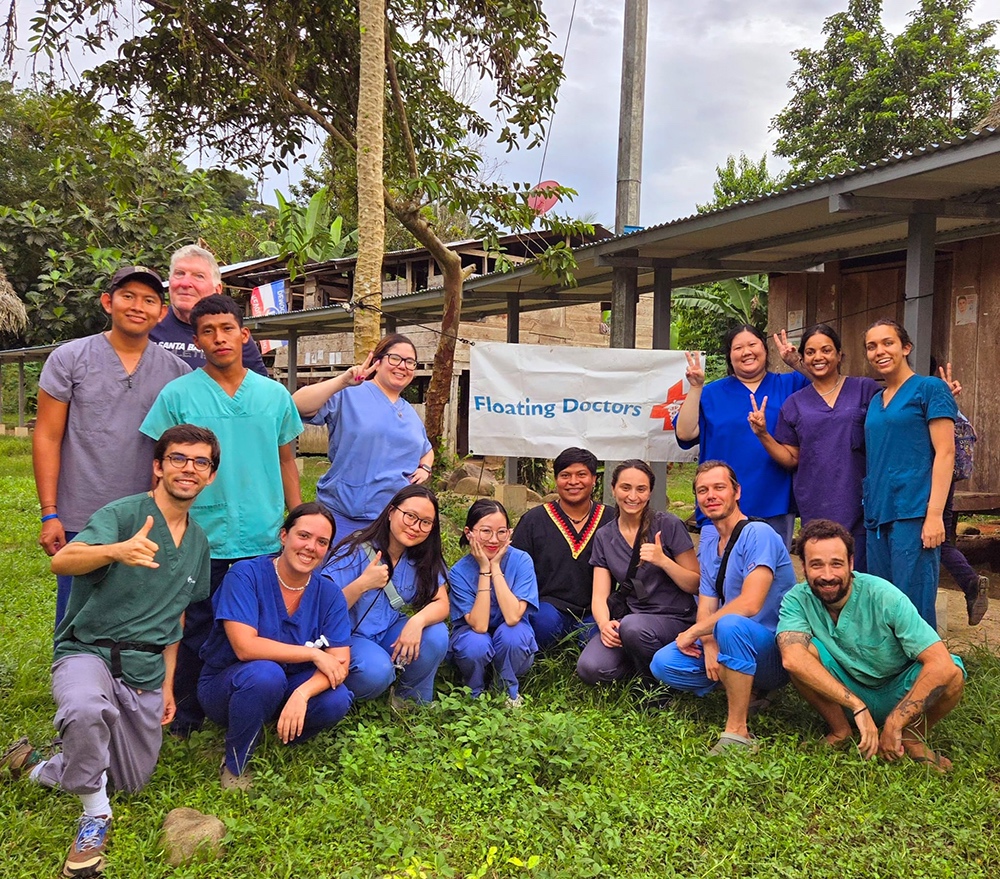
Volunteers for the week including physicians, a veterinarian, a dentist, medical students, and one OT.
Months later, I would find myself in a rainforest, translating for a classmate who graduated from medical school in Indonesia, learning how best to explain things to individuals who grew up in a completely different context than myself. Floating Doctors works with the members of the Ngäbe, an indigenous population in the Bocas Del Toro province of Panama. This region is designated as part of the Ngäbe-Buglé comarca, an officially recognized province that is part of how the nation is divided, similar to statehood, which allows for self-governance among the indigenous population. To get there, I flew from LAX to Panama City, then travelled to a second, smaller airport in Panama City to fly to Bocas del Toro, an island in the northern archipelago region of the country.

Preparing to land in Bocas del Toro
During clinic, we slept outdoors in the rancho where we provided services in hammocks strung from metal beams and bathed in the river, as do the community members. However, I will say that it was not the most rugged camping experience of my life. We had indoor plumbing, could purchase wifi from a nearby home, and had meals cooked for us by local women. Patients brought goods to sell, like the best chicken empanadas I’ve ever tasted, sizable chicken tamales wrapped in banana leaves, and artisanal breads. Some families told me they walked for a day through the mountainous terrain to be seen by the doctors. Did I mention that the weather hovered around 90 degrees and 100% humidity? The patients came well-dressed, with women in nice dresses and men in polos and jeans. I got the feeling they were dressed up to see us, but also because they would be seen by many other people who were also attending the clinic.
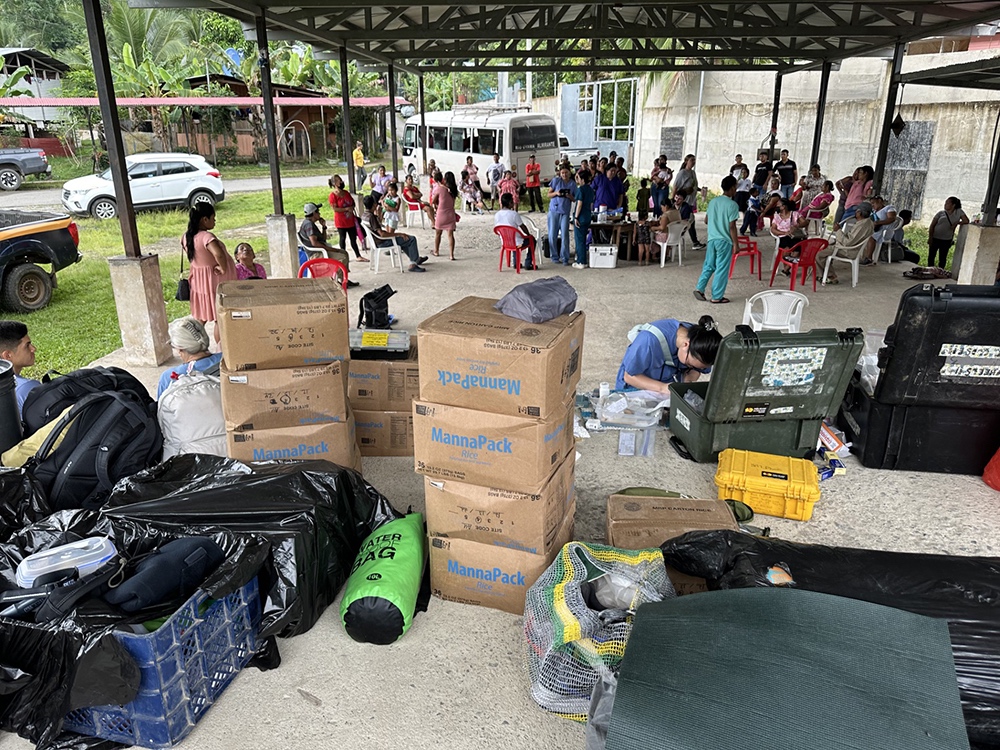
Preparing for a day of clinic. Folks were lined up before we arrived.
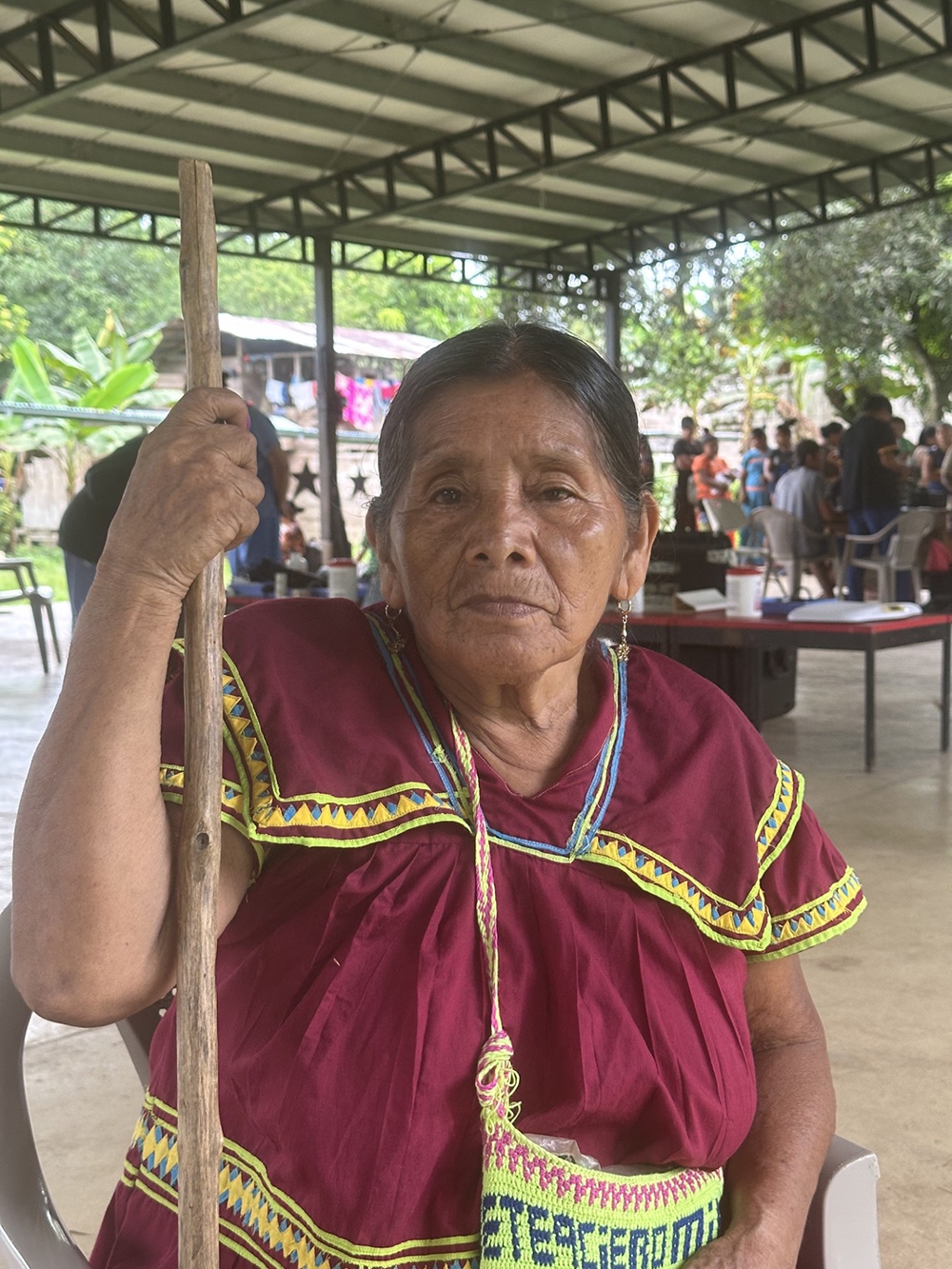
A visitor to the clinic wearing a traditionally-adorned dress (photo taken with permission).
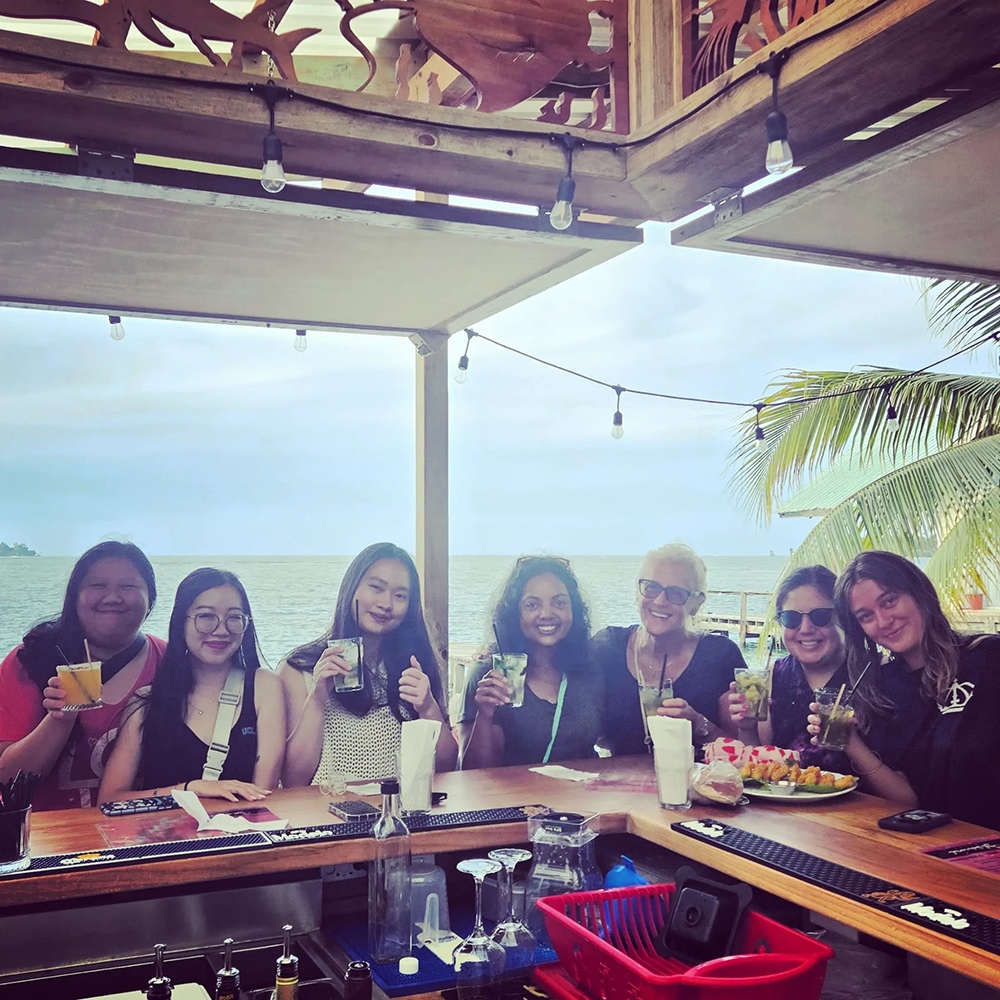
Enjoying refreshments (with ice!) with other volunteers in Bocas after a successful week of clinic.
Visitors to the clinic generally fall into two categories: fast lane or chronic. Fast lane is for new or relatively simple cases, such as needing paracetamol to manage fever, albendazole for concerns about parasites, or birth control injections. Chronic patients are seen every three months, as the team returns to each site regularly, cycling through the 28 sites they service. Though the providers change, there is still consistent care for diabetes, hypertension, and asthma, to name a few of the more common conditions. Patients can have their names put on a list for a doctor who comes by to perform cataract surgery as part of another program. Referrals can also be given in cases where a patient requires more or specialist care, such as the case of a 6-year-old girl who seemed to be struggling in school, based on her mother’s description. Though I did an informal writing assessment, she would need more testing to determine if she was reaching developmental milestones, something the organization is not equipped to offer at this time.
To be seen by specialist medical providers, they would need to go to a major town nearby. Although this community had a medical clinic nearby, the resources there were limited. Travel to David, a town with more medical resources, would require a bus ticket and potentially a stay in the city, a prohibitively expensive expenditure for some of the patients. Boquete is closer, though it is not as well-resourced and still requires a bus ticket to get through the mountains on rocky dirt roads, which do not have lights, limiting travel for safety reasons.
This trip felt challenging to my professional identity. As a new practitioner, I worry about the role OT can play in different contexts. The lead medical provider for the week was not familiar with OT, or Ergotherapy as it is often referred to in Europe. He told me that this does not exist in his home country of Russia. The World Federation of OT only credentialed the University of Panama’s OT program last year, in 2023. I wondered about the relevance of the profession to people whose activities of daily living (ADLs) likely consist of more life-sustaining occupations than mine do, such as gathering water or washing clothes by smacking them against rocks in the river, in addition to household management tasks like washing dishes and cleaning the house.
I could see the applications of OT for those who worked cutting bananas, as they suffer from repetitive motion injuries, for children in school, and likely, for individuals with mental health concerns, if I were to speculate. However, I also acknowledge that I don’t really know much about their everyday lives because I didn’t have the opportunity to get to know them in the ways that would be necessary for an OT evaluation. I longed to know more about what an average day is like, as this would allow me to begin imagining what role occupational science (OS) could play in trying to understand what life is like for the Ngäbe. If OS has taught me anything, it is that I am not an expert on the culture of the Ngäbe. In order to work with a population in a way that garners buy-in, one has to try to understand the values to support what is important to their patients.
All of this is not to paint a picture of an area with fewer resources; after all, there are rural areas of the US with limited access to hospitals or routine medical care. Instead, I hope that Panama provides opportunities for OT and OS to continue to develop in multiple contexts, ranging from the traditional academic experiences OT graduates may have in the larger metropolitan areas, to the volunteer OT services with Floating Doctors, as well as others yet to come.
For my final occupational therapy doctorate (OTD) project, I created a set of OT practice guidelines or a white paper, in support of the development of OT services for Floating Doctors. The hope is that this will allow for the expansion of OT services within the organization, encouraging more OT volunteers to attend, and familiarize the individual medical providers with the scope and potential interventions OT can provide. It will also be part of the information Floating Doctors provides the Panamanian government to continue its services there.
⋯
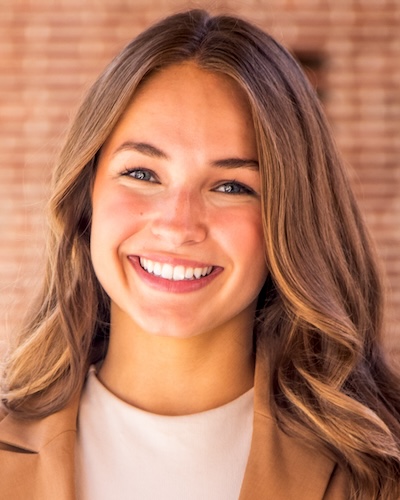
Day In the Life of an Undergraduate BS-OTD Student Vlog ⟩
December 10, 2024, by Avery
Classes Community Getting Involved Living in LA School/Life Balance Videos
Join me as I take you through what a typical day looks like as an undergraduate student in USC Chan’s accelerated Bachelor’s to Doctorate program in Occupational Therapy! One of the things I love most about this program is the balance it allows me to strike between my occupational therapy (OT) courses, engaging electives, general education classes, extracurriculars, and free time.
From participating in enriching clubs and student organizations to spending quality time with friends and exploring the vibrant city of Los Angeles, I’m able to enjoy a well-rounded college experience while still focusing on my OT studies.
As always, if you have any questions about the BS-OTD program from an undergraduate perspective, feel free to reach out!
⋯
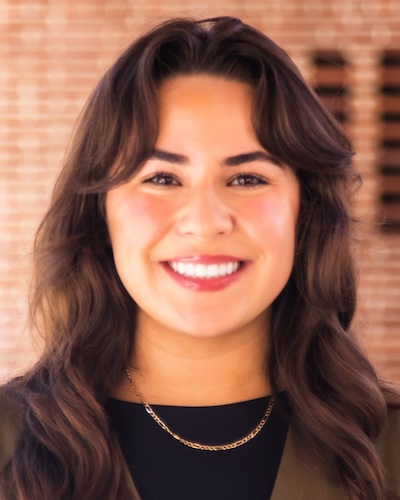
Connecting with OTs ⟩
November 16, 2024, by Kimberly Rochin
Let’s face it: occupational therapy is an incredible field that’s evolving and expanding daily. The beauty of OT lies in its versatility, allowing therapists to address patient needs at every life stage and in almost any environment. Yet, with so many specialties and settings, it’s hard not to feel a bit of F.O.M.O.
That’s where building connections comes in. Networking with other professionals in the OT community can open up insights that enrich our learning. I’ll share practical tips and strategies for connecting with professionals that worked best for me!
1. Do Your Homework
Before reaching out, take a few minutes to learn about the person. Knowing a bit about their background and interests shows that you’re genuinely interested and can help you connect more meaningfully. Some great platforms are LinkedIn, the individual’s affiliated organization (for example, clinics or hospitals), or even just a quick Google Search. You don’t need to know ALL the information about them; you can just bounce back from a few pointers.
2. Be Intentional
Make your outreach purposeful. Think about what you hope to gain from the connection (e.g., insight into a specific setting or advice on a skill), and communicate that. By practicing intentionality, you are respecting the recipient’s and your time!
3. Email/Point of Contact
Don’t underestimate the power of a well-crafted email! A friendly, concise message can open doors to meaningful connections. Remember to introduce yourself and be clear about why you’re reaching out.
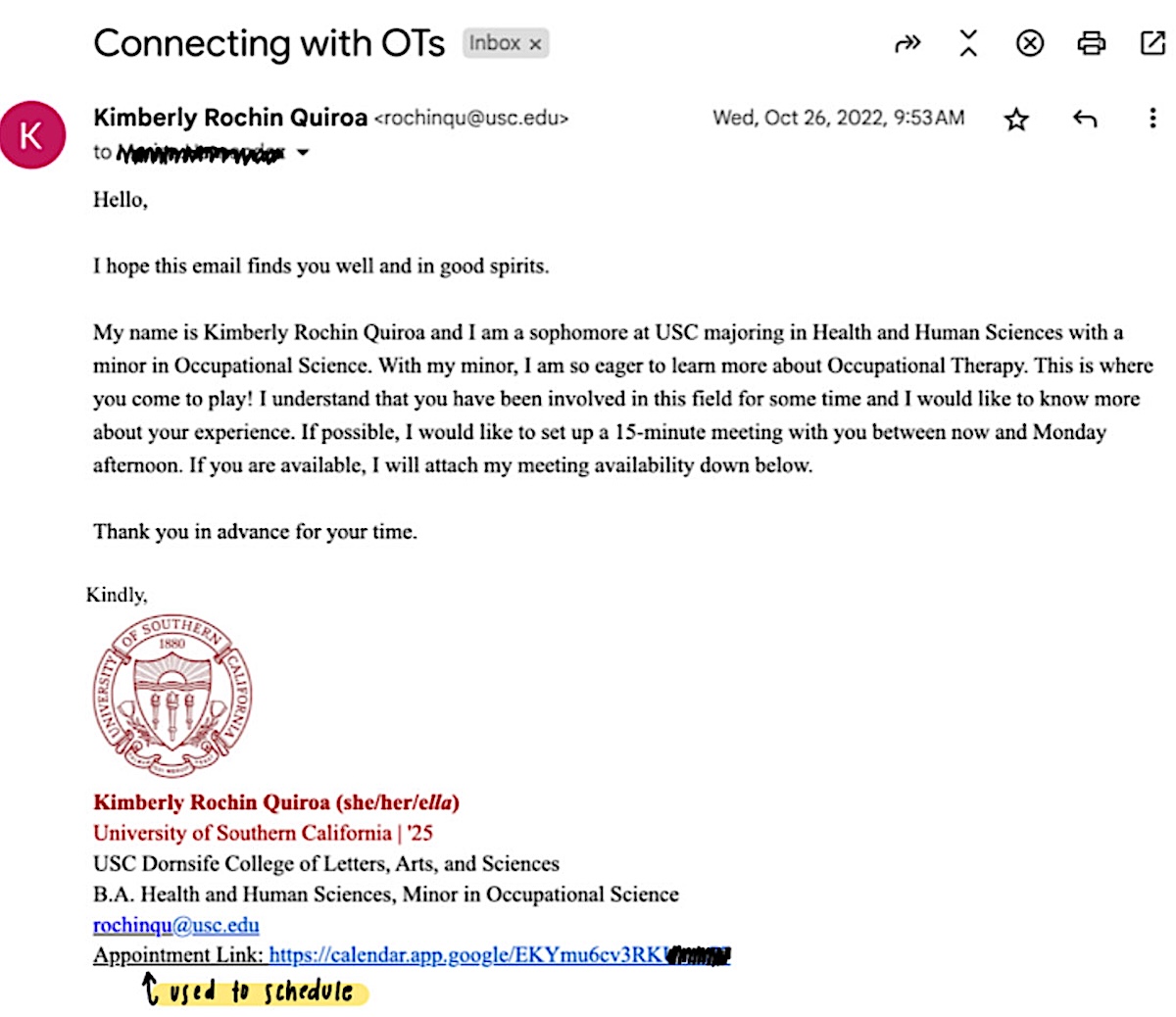
Example outreach email
4. Be Okay with ‘No’ and Flexible with Schedules
Professionals are busy, so don’t be discouraged if someone can’t meet immediately. Respect their schedule and offer alternative times. Patience and flexibility go a long way in showing your appreciation for their time.
5. Scheduling
Offer specific times you’re available to make scheduling easier. Once you’ve confirmed, show up on time and bring prepared questions. If you’re juggling multiple meetings, use a scheduling tool to streamline the process. It keeps things organized and helps you avoid double-booking — showing that you value their time and your own. I use the “Appointment Schedule” feature on Google Calendar. Not only does it make scheduling easier, but I have also received several compliments about my organization!
6. The Meeting . . . OooOOoo
There’s no need to be nervous; just relax and enjoy the conversation! If you’re meeting virtually, ensure you’re in a distraction-free environment with reliable internet and present your best self. I find it helpful to jot down a few bullet points of topics I’d like to discuss; keeping them brief ensures the conversation feels natural (remember: it’s not an interview!).
If you’d like to take notes, let the professional know beforehand. This way, they understand you’re focused on the conversation and aren’t multitasking. Small steps like these can help create a comfortable environment for a productive meeting.
7. Follow Up with a Thank-You
Always follow up with a thank-you email or note. It’s a simple yet impactful gesture that reinforces your appreciation and can leave a lasting positive impression. If you would like to continue connecting, indicate that in the email.
8. Final Thoughts
While these tips have worked well for me, remember that each connection is unique, and there’s no one-size-fits-all approach. Building meaningful relationships in the OT community takes time, patience, and a willingness to adapt. Be open to learning from each experience, and don’t be afraid to try new approaches. So, go out there, make connections, and enjoy learning!
⋯

My OS Minor Recommendations ⟩
November 13, 2024, by Cara
Classes Life Hacks School/Life Balance
Spring course registration is already underway, and if you’re still on the hunt for classes to fill up your schedule, you’ve come to the right place! Whether you’re considering a minor in OT or just looking to create a healthier and happier lifestyle for yourself — here are my recommendations.
OT 101: Caring for Your Self: Engaging in Healthy Habits and Routines
OT 101 is all about YOU! This course helps you learn about self-care practices to incorporate in your everyday life, like mindfulness, setting goals, and time management. Throughout the course, I was paired up with another student for weekly meetings where we reflected on our self-care experiences and feelings. Sometimes we did activities together, like yoga, drawing our breath art, or eating. It was a great experience that helped me improve self-awareness and also built a lasting friendship. Since taking this class, I’ve realized how self-care is not a luxury — it’s a necessity for overall wellness. I’ve noticed improvements in my productivity, calm mindedness, and greater self-acceptance by making time for myself. College can often feel like an endless race where we neglect our health and personal needs, but taking time for self-care can make all the difference.
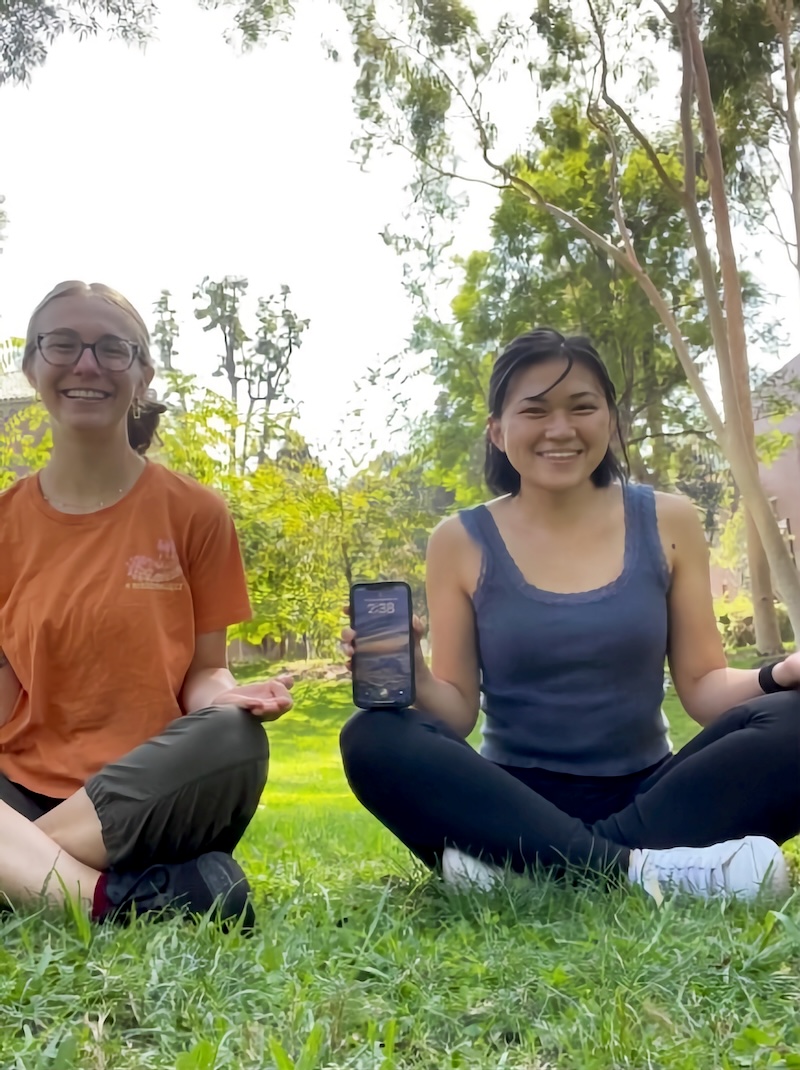
Me and my partner, Mahalia, doing yoga!
OT 251: Across the Lifespan: Occupations, Health, and Disability
In OT 251, I learned about how people grow and change as they go through life and how this affects the activities they find meaningful. We explored human development by looking at different factors like biology, psychology, society, and culture, and how these all connect to shape what people are interested in and value in their lives.
What made this class really fun was the emphasis on building a positive and engaging learning community through peer learning. I often worked in groups on case studies, role-played different stages of development, and did discussions where my group mates and I reflected on our development and how it affects what we do. I really connected with my peers through both our shared experiences and differences, deriving new insights on how development is nuanced. And I still keep in touch with them to this day!
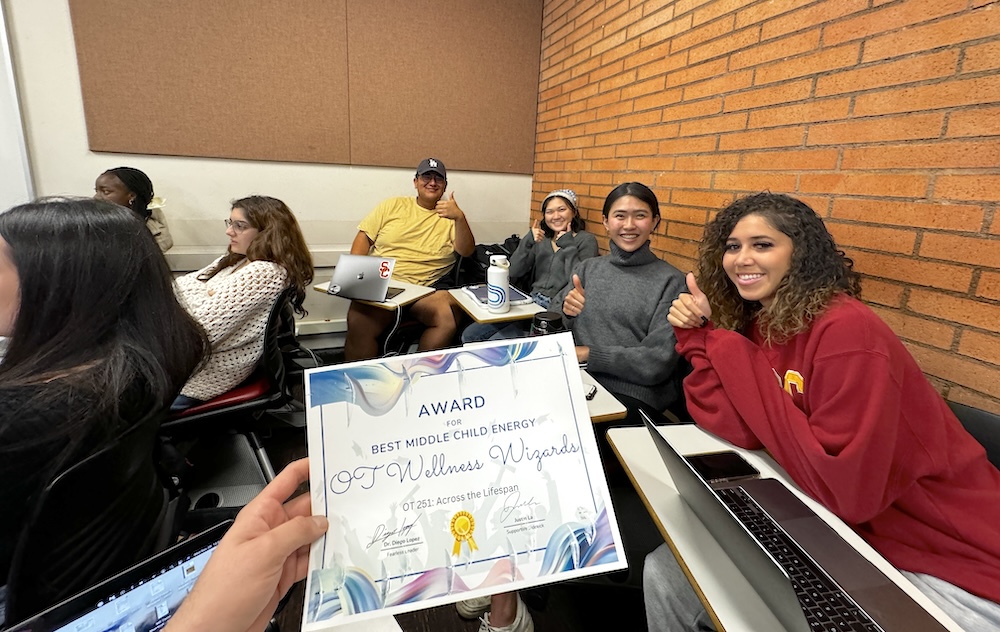
At the end of the semester, my group and I, called the “OT Wellness Wizards,” received the award for “Middle Child Energy.”
OT 340: Animal and Human Interconnection in Daily Life
If you love animals, OT 340 is a must! This course explores the relationship between humans and animals. I learned about K9s, therapy dogs, foster animals, among many others. Occasionally, some furry friends came to visit too. As part of the course curriculum, I spent 8 hours interacting with animals to further understand how humans and animals affect one another. I volunteered at a local shelter, walking German Shepherds for two hours each week. The experience was rewarding, teaching me about humility, compassion, and loyalty. I also found it amazing how animals still love us no matter how we treat them, and continue to persevere to live a better life than before. If that doesn’t convince you, I don’t know what will!
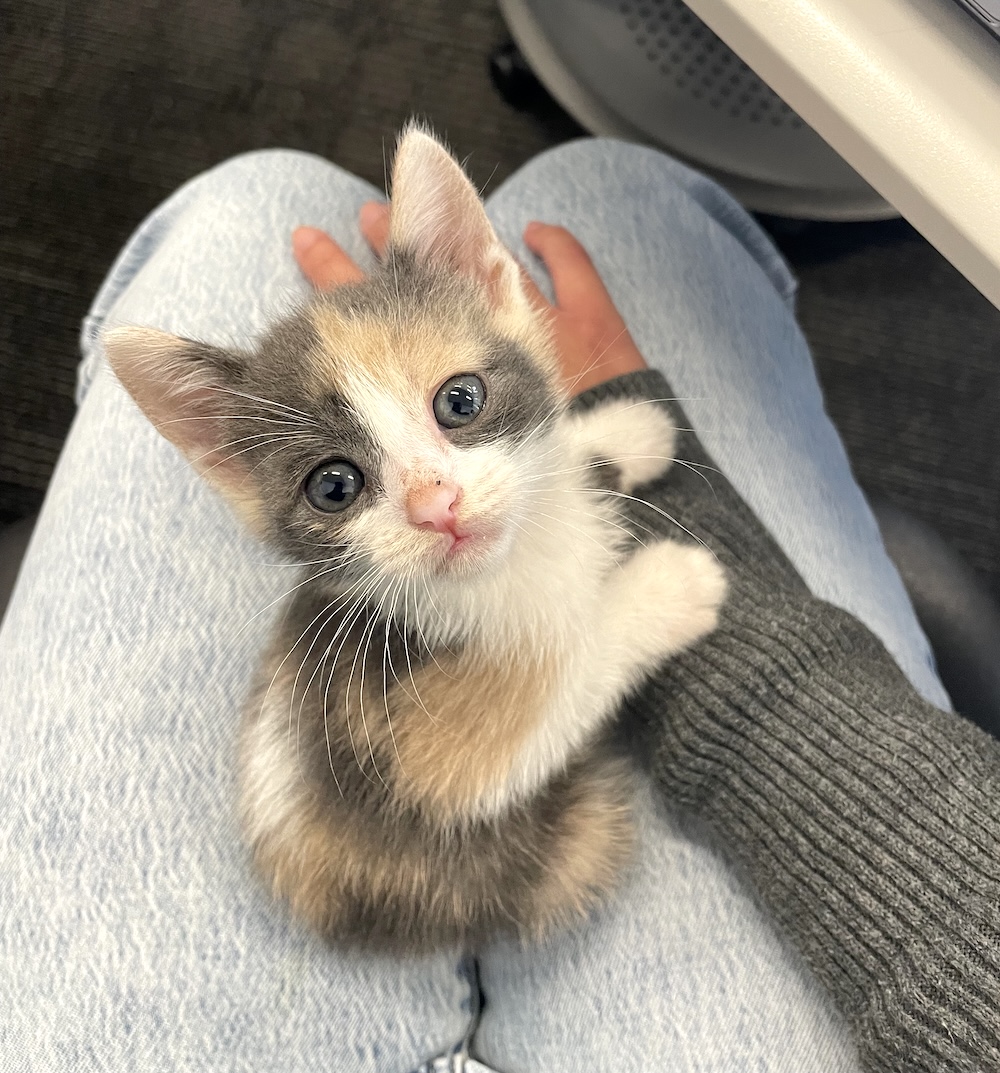
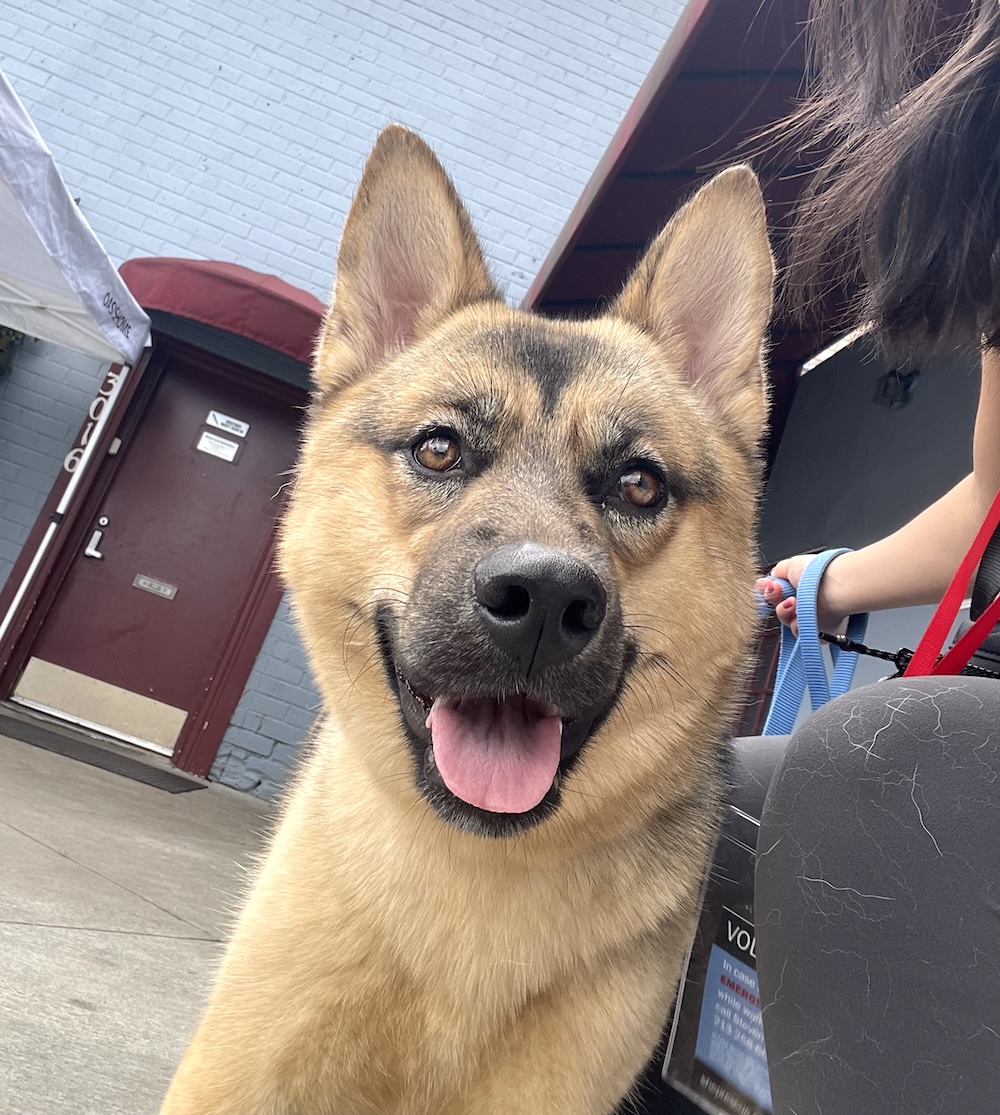
These courses are just a taste of what the OS minor has to offer, and I encourage you to consider them as you finalize your spring schedule. They will deepen your understanding of both yourself and others while providing practical skills you can apply in your everyday life. Check out our other OS courses here!
⋯





